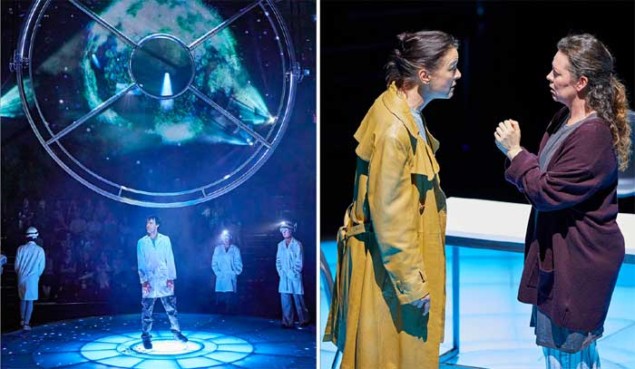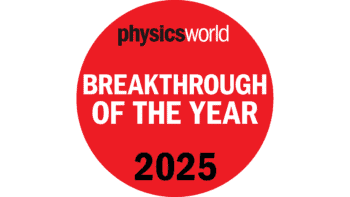Arthur I Miller reviews the National Theatre play Mosquitoes

There are many ways to blend science and theatre. An episode of discovery perhaps, like Albert Einstein’s discovery of relativity theory as told in the recent television series, Genius; merging politics, science and world events, as in Michael Frayn’s Copenhagen; or using science as the backdrop to the plot, which is the case in Lucy Kirkwood’s Mosquitoes. What is paramount to such projects is to avoid bombarding the audience with science lectures. The science should emerge from conversation and this is no easy task. Mosquitoes is a superbly acted and complex play about the clash of human emotions, but in some ways, the science of the Higgs boson and the Large Hadron Collider (LHC) at CERN is irrelevant to the plot and could almost be left out.
The story turns on a confrontation (collision, get it?) between two sisters as opposite as night and day. One, Jenny – played by Olivia Colman – who lives in Luton and sells medical insurance, is utterly daffy, curses like a trooper and drinks like one too, but has a heart of gold. The other, Alice – played by Olivia Williams – is an austere scientist at the LHC. Her passion is to find the Higgs boson. Science is her life and her character all too frequently seems like a stereotype.
Alice is often caught up in conflict with Jenny and her mother, or is distracted by her work. She especially seems to ignore the needs of her uncommunicative teenage son, Luke (Joseph Quinn), who is sunk into the depths of unhappiness and boredom over life in Geneva. Poking fun at Switzerland’s boredom peppers the play. Luke is socially awkward and spends a lot of time sitting in front of his computer. He wants to leave the country, or at least switch schools, but his mother is too involved in her work to help him out. Alice’s husband disappeared some years ago and she still pines for him.
The play opens in Luton with Alice visiting Jenny who is pregnant. A year passes and Jenny is now visiting Alice in Geneva, with their mother in tow. It soon emerges that Jenny’s baby was not vaccinated, because she was taken in by the scare about the MMR vaccine. Although Jenny is visiting her sister for some rest and sympathy, deep down she blames Alice, who is after all a scientist, for not telling her that she must have the vaccine. Their mother, Karen (Amanda Boxer), was a major theoretical physicist at the University of Cambridge. She claims that her great discovery – concerning liquid helium, which turned out to be of importance to the LHC, she emphasizes – was appropriated by her now deceased husband who won a Nobel Prize; being a woman she was ignored. She is on the cusp of dementia but still the feisty mother of two warring sisters. She abuses Jenny, who takes daily care of her, and calls her stupid and irresponsible, while lauding the scientist Alice.
Then there is a character, or presence, who strides around the stage in a white coat (Paul Hilton) – to designate that he is a scientist – and delivers animated lectures on the universe and the meaning of life. His lectures are full of shock and awe, about particles colliding in the LHC and what the results might be. Thunder, lightning, and ear-splitting noise bombard the audience. Who this character is supposed to be is not clear. At first I thought he was some sort of apparition of Alice’s husband, but according to the text of the play, he is also a manifestation of the Higgs boson.
Kirkwood introduces, and then drops, the big theme of scientists “inventing” hypotheses in order to explain certain unknown phenomena – such as why certain elementary particles have mass, having been born with none. For this purpose a field was hypothesized that, metaphorically, has the consistency of molasses – by slogging their way through it these particles generate their masses. Peter Higgs, among others, elucidated this field further by taking into account the fact that in quantum physics every field has a particle associated with it. The electromagnetic field, for example, is associated with the light quantum. Higgs theoretically predicted the Higgs boson, which was substantiated at the LHC, thereby proving the existence of the mass-generating field – now called the Higgs field. Scientists favour hypotheses like these because of their enormous explanatory powers. With all the pyrotechnics in the physics lectures, it’s too bad this didn’t find a more concrete place in the production, which would have further cemented its links with physics. Jenny’s response, by the way, to these momentous proceedings is to ask why scientists couldn’t have invented something to save her marriage.
What of the enigmatic title Mosquitoes? Kirkwood offers two hints. Karen, in a throwaway line, compares the head-on collisions of protons in the LHC to “the forces of two mosquitoes, flying into each other”. The point of this often-used metaphor is that the energy possessed by a moving mosquito happens to be about 1 TeV, while the LHC can accelerate protons to 7 TeV. Among the differences between a mosquito buzzing around and bothering us, and a proton zipping through the LHC, is that the proton is travelling near the speed of light. Equally crucial is the fact that in a proton, a huge amount of energy is squeezed into a volume a million million times smaller than a mosquito, meaning that a collision between two protons is much more spectacular than two mosquitoes. Might there have been some theatrical magic Kirkwood could have spun here?
The other place where mosquitoes enter, and then just as abruptly disappear, is when Alice’s boyfriend Henri (Yoli Fuller) reveals that he too is a scientist, who works for the World Health Organization and is looking at ways to eliminate the mosquito responsible for malaria. Perhaps Kirkwood means mosquitoes to be omens of doom. Protons smashing into each other in the LHC might produce some havoc that could destroy our planet and maybe our universe; and real mosquitoes can cause deadly malaria.
In essence, Kirkwood attempts to touch all bases, which is unnecessary. But I highly recommend Mosquitoes for its emotional depths, spellbinding acting and occasional dazzling physics lectures.
- Writer: Lucy Kirkwood, Director: Rufus Norris
- Showing at the National Theatre’s Dorfman Stage, London, until 28 September



